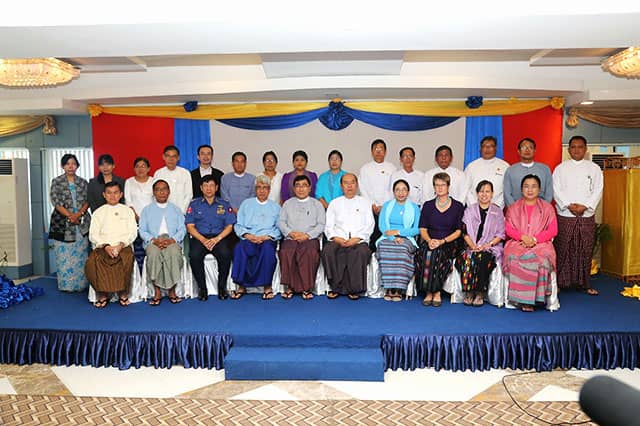Workshop to Consult Government Departments on the Draft Handbook on Employment of Persons with Disabilities

On 17th August 2018, Myanmar Centre for Responsible Business (MCRB) and Association for Aid and Relief (AAR) Japan, with the support of Department of Rehabilitation, Ministry of Social Welfare, Relief and Resettlement held a meeting to obtain feedback on the draft handbook on employment of persons with disabilities.
The consultation at Zabuthiri Hotel, Naypyidaw was attended by around 40 senior government personnel including Union Minister Dr Win Myat Aye, Ministry of Social Welfare, Relief and Resettlement, and Deputy Ministers from Ministry of Education, Ministry of Transport and Communication, and Ministry of Defence. Also participating were senior officials from the Ministries of Social Welfare; Labour, Immigration and Population; Health and Sport; Education: Culture; Industry; and the Union Attorney General’s Office, as well as senior office-holders in the Myanmar National Committee for Women's Affairs, the War Veterans Association and other members of the Working Committee on Rights of Persons with Disabilities, as well as other experts on disability rights.
In Union Minister’s Dr Win Myat Aye opening remarks, he noted that creating employment opportunities for persons with disabilities is essential and a priority for the government. The Ministry’s mandate includes providing rehabilitation services, and it recently established the Department of Rehabilitation to address issues of persons with disabilities. The Minister referred to the recent London Disability Summit at which he represented Myanmar and made a commitment to the Charter for Change. For Myanmar to successfully protect the rights of persons with disabilities, systematic collaboration with other governmental departments is essential, as well as civil society and the wider public. This includes collaboration between government, employers and persons with disabilities to promote employment opportunities; provision of inclusive education and technical and vocational education by government and other partners; and assistive information and communication technologies (ICT). He highlighted the need to implement the registration of people with disabilities, not least to be able to survey and have a better understanding of who they were and where they are and what their needs are. He welcomed the handbook and its inclusion of success stories which demonstrate that every person with a disability wants a chance to demonstrate their ability.
U Nay Htun, representing the Myanmar Federation of Persons with Disabilities highlighted that according to Myanmar Census, 4.6 % of the population of Myanmar have a disability in Myanmar and he urged implementation of the 2015 Law, and 2017 bye-law to ensure that their rights were protected.
Vicky Bowman, Director of Myanmar Centre for Responsible Business, explained how MCRB worked on activities relating to business and disability, including encouraging businesses to be more inclusive of persons with disabilities as customers, and as employees. She highlighted the findings of a multi-stakeholder workshop on Promoting Employment Opportunities for People with Disabilities (PWDs) cohosted by MCRB and the International Labour Organisation, on 21 November, 2017.
Yoshio NAKAGAWA, Association for Aid and Relief Japan, presented their activities in Myanmar.
In discussion, it was highlighted that guidance and awareness was needed for government departments, many of whom were unaware that it was now illegal to discriminate, for example in recruitment advertisements, on grounds of disability. Participants provided feedback on the handbook, including whether it should be circulated to government employers as well as business, or whether a government-specific version should be developed. It was suggested that public service success stories, including those from the Rehabilitation Department of the Ministry of Defence who had successfully been placing service personnel with disabilities into civilian employment for many years. Other topics discussed were the question of quotas, which have not yet been set under the law, and the need to address existing challenges concerning transportation, education, health care services, etc.
The handbook will be revised and published shortly. It is likely to be updated with further editions as law and policy develops, including any developments on classification and registration of people with disabilities, and quotas. MCRB will support the Ministry in promoting a dialogue with Myanmar and international businesses to enhance employment opportunities for people with disabilities, drawing on the resources in the handbook.
အထက်ပါအကြောင်းအရာနှင့်ပတ်သတ်၍ ဆက်လက်ဖတ်ရှုလိုပါက
- ငါကငါပါ ၏ မသန်စွမ်းမှုဆိုင်ရာ ဗီဒီယို
- မသန်စွမ်းသူများအား အလုပ်ခန့်ထားခြင်း၊ မြန်မာနိုင်ငံရှိ အလုပ်ရှင်များအတွက် လက်စွဲစာအုပ်
- MCRB မှ မသန်စွမ်းသူများ ဦးဆောင်/ပါဝင်သည့် အသေးစား၊ အငယ်စားနှင့် အလတ်စား စီးပွားရေးလုပ်ငန်းအကြား ချိတ်ဆက်ဆောင်ရွက်မှုအား မြှင့်တင်ခြင်း (တတိယအကြိမ်)
- မြန်မာနိုင်ငံအတွက် B2C ၀န်ဆောင်မှုနှင့်သက်ဆိုင်သော အထောက်အကူပြု နည်းပညာများအား မျှဝေခြင်း
- မြန်မာနိုင်ငံ၏ “တည်ဆောက်သော ပတ်ဝန်းကျင် (Built Environment)” အတွက် “လူ့ဂုဏ်သိက္ခာကို အလေးထားသော ဗိသုကာဒီဇိုင်း (Dignity By Design) ” အား ထည့်သွင်း ဆွေးနွေးခြင်း
 English
English မြန်မာ
မြန်မာ မြန်မာ (unicode)
မြန်မာ (unicode)










